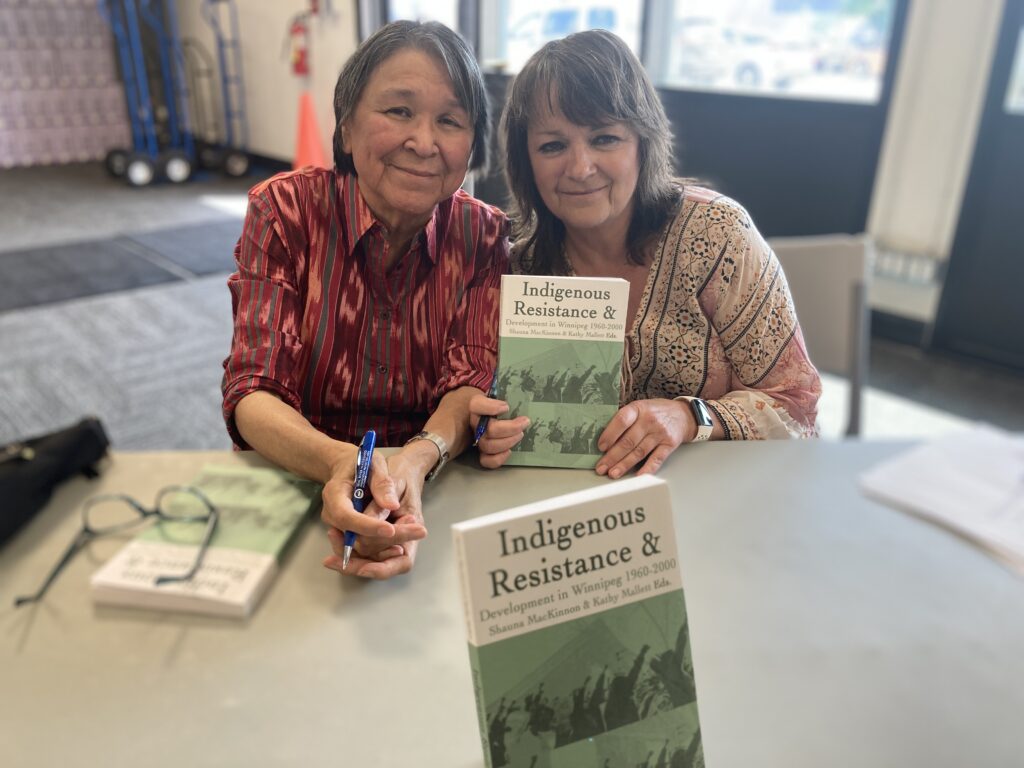On June 28th, 2023 as we neared the end of Indigenous History month, we gathered at Ma Mawi Wi Chi Itata Centre in Winnipeg’s North End. We were there to launch the release of the book: Indigenous Resistance & Development in Winnipeg 1960-2000. Kathy Mallett and I were the editors of the book, but we had lots of help from contributors including Nicole Lamy, John Loxley, Lawrence Deane, Lynne Fernandez, Doris Young, Annetta Armstrong, Chantal Fiola and Albert McLeod.

The book was the second phase of the Preserving the “History of Aboriginal Institutional Development in Winnipeg”, more commonly known as the “Indigenous Archives Project”.
The project began around 2011 when Kathy, who was a member of the Manitoba Research Alliance (MRA) Research Committee, approached founding Principal Investigator John Loxley about the need to archive the history of indigenous activism that led to the development of important organizations in Winnipeg. Approximately 40 Indigenous leaders were video-interviewed by Darrell Chippeway and Larry Morrisette.
Fast forward to 2017. I was teaching a course at Merchants Corner and I showed a brief video from the Archives project that featured Kathy Mallett, Leslie Spillet, Josie Hill, George Munroe, Doris Young, Lucille Bruce, Larry Morrissette, Vern Morrissette, Stan McKay and a few others who spoke about the Indigenous development that they were involved in the latter part of the 20th century. The students were inspired but also surprised – they knew about the Ma Mawi Wi Chi Itata Centre, Native Women’s Centre (now Indigenous Women’s Healing Centre), Children of the Earth School, the Aboriginal Centre and the Indian Metis Friendship Centre, but they had no idea how these organizations came to be.
I was surprised, and sad, that these students, many Indigenous and living in the inner-city where much of the organizing began, did not know of this history and the amazing Indigenous leaders involved. So, I asked Kathy to work with me to develop a university course based on the Archives Project and the MRA provided us with a bit of financial support. Kathy searched for resources, but soon learned how difficult it was to find anything written about this history, especially told by the people who were involved. Kathy and I invited John Loxley to discuss with us the possibility of putting together a book that would tell these stories, featuring the voices of those involved in the work. John was of course keen to be involved.
Pandemic restrictions made things challenging. We had a further setback when our dear friend and colleague John Loxley passed away. We weren’t able to get into the University of Manitoba Archives where much of the material we needed is stored. Fortunately we were able to access most of the video interviews and other important documents, and thanks to a great group of authors who were equally committed to telling these stories, we were able to complete the book this year.
There are at least two more phases to this project. We are in the process of developing an audio series to accompany the book to make these stories more broadly accessible. These will be made available on the Manitoba Research Alliance website. Beginning fall 2023, the book will be used as the primary resource for the course: History of Indigenous Institutional Development in Winnipeg. It will be offered at Merchants Corner.
The book, and the course, are dedicated to the many Indigenous people who have committed their lives to reclaiming Indigenous spaces of hope in Winnipeg. Also to the memory of our dear friends John Loxley and Larry Morrissette, who were instrumental to the project.
This quote from the book provides a sense of the passion of those activists involved in creating and reclaiming Indigenous spaces in Winnipeg.
…Ma Mawi Wi Chi Itata Centre was the catalyst that started everything in the community, all of the different services, organizations came …because Ma Mawi could catalyze the energy and the strength of the community. A whole bunch of other things were able to develop, a whole bunch of new resources in the community, new services in the community aimed at Aboriginal people…Children of the Earth High School… Niji Makhwa became a reality, that, that whole energy that was started by those women and those young people, and us. …I’m honoured, I’m humbled to have been a part of that history uh because that was an amazing time, that was an amazing time for activism, for Aboriginal activism based in an Aboriginal understanding of what we had to do…it was an amazing time.
Vern Morrissette

